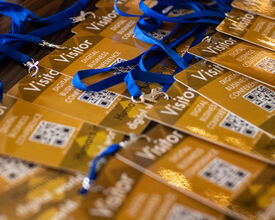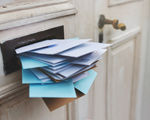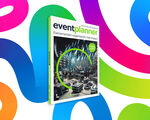Event name badges might seem like a small detail, but their impact is anything but minor. A well-crafted badge doesn't just identify an attendee; it enhances networking opportunities, reinforces security, and aligns seamlessly with the event's branding.
This guide will discuss essential considerations and creative ideas for designing name badges that elevate the attendee experience and make a lasting impression.
1. Understanding badge functionality: more than just a name
Badges serve a primary purpose, but there's a world of opportunity beyond just listing names and titles. To maximize their functionality, consider how badges can support the event's goals, from fostering networking to enhancing security.
Key elements to consider:
- Networking boosters: Larger text for names, job titles, and company names helps attendees quickly identify one another's roles and interests. Ensure the font is visible from a reasonable distance to make networking seamless, even across a room. Use high-contrast colours for better readability under various lighting conditions.
- Colour coding by role or ticket type: Differentiating badges by attendee type (e.g., speaker, sponsor, VIP) can streamline interactions and make it easy for staff to identify specific groups.
2. Design principles: Visually striking yet functional
Badges represent the event's brand and should reflect its identity while being functional and practical. Effective design requires a balance of aesthetics and usability.
Key design tips:
- Brand Consistency: Match the badge design with the event's visual identity, using colours, fonts, and logos that align with the brand. This builds a cohesive experience for attendees.
- Prioritize information hierarchy: Place the attendee's name prominently, followed by their title and company. A clear layout helps attendees find the most relevant information at a glance.
- Durable and sustainable materials: Consider materials that not only look professional but are also eco-friendly. Options like recycled paper, biodegradable plastics, or reusable badge holders show a commitment to sustainability. If the badge is environmentally friendly, include a small note indicating this - attendees appreciate the extra effort.
What to include on an event badge:
- Attendee's name: Clear and easy to read.
- Job title & company: Helps other attendees understand their role.
- Role identification: Colours or icons to denote specific event roles like speaker or sponsor.
- QR Code or RFID: A digital element linking to profiles, event apps, or session schedules.
- Social Handles: These are optional but useful for industry events where networking is a priority. They can also be accessible after scanning the QR code, for example.
The back of a name badge also provides valuable real estate for essential information or sponsor messaging. Consider including an event sponsor’s message, exclusive discount codes, WiFi details, contact information for assistance, a QR code to download the event app, or even the official event hashtag to encourage social sharing. This additional space can enhance the attendee experience and create extra engagement opportunities throughout the event.
3. Security-enhanced badges: keeping events safe
Integrating security features into badge design can help protect attendees and organisers in an age where event security is paramount.
Badge security features:
- Holographic elements: These can be difficult to replicate, reducing the risk of unauthorised access.
- RFID or QR code access: QR codes and RFID chips allow for streamlined check-ins and access to secure areas. This can prevent bottlenecks and ensure that only authorised attendees are present.
- Colour-coding for quick role identification: For events where security is especially tight, colour-coding or different border styles for VIPs, staff, and general attendees make it easier for security staff to manage access at a glance.
4. Personalisation and interactive badge design
Badges don't have to be one-size-fits-all. Interactive and personalized badge features help attendees feel more connected and comfortable, and they can even foster networking.
Ideas for personalisation:
- Interest-based stickers: Let attendees select stickers or pins that reveal something about them, like 'Foodie' or 'Looking to hire'.
- Writable surfaces: Include a small area on the badge where attendees can add their own 'Ask me about...' information. This can serve as a conversation starter.
- Event-specific icons: Add icons related to session tracks, interests, or roles so attendees can quickly find others with similar interests.
5. Designing badges that last beyond the event
Event badges can also serve as memorable keepsakes, extending the branding reach even after the event ends. Thoughtfully designed badges are functional during the event, and something attendees might keep and share, serving as a unique reminder of the experience.
Ideas for take-home badge designs:
- Keepsake lanyards: Using lanyards with event branding and the year makes the badge worth saving and may encourage attendees to post it on social media.
- Commemorative badges: Consider creating a unique, limited-edition badge design that attendees will want to keep.
- Photo-op-ready badges: Create badges that look good on camera, encouraging attendees to share their experience online and increasing the event's visibility.
6. Event software and ticketing
Effective badge design doesn't stop at aesthetics - it's also about integrating with tools that streamline attendee management and elevate the overall experience. This is where eventplanner.net’s event software can make a difference. With our platform's smooth ticket creation and scanning, event planners can ensure a quick and professional check-in process. Plus, we're developing a badge printing feature to make badge production even more accessible and more cohesive. For updates on this new feature or to explore how our software can support your event, feel free to contact our product team.
Conclusion: the badge as a gateway to a better event
A well-designed event badge is more than just a name tag - it's a networking tool, a security measure, and a piece of the event's branding. By focusing on clear information hierarchy, personalisation, and security features, you can ensure that each badge serves its purpose and enhances the overall attendee experience. Remember, the little details matter, and with a thoughtfully crafted badge, you can make a positive first impression long after the event concludes.
With these insights, event planners can create badges that do more than identify attendees - they become an integral part of the event experience, fostering connections and reinforcing the brand’s identity.










Personalisering met on demand geprinte badges is zeer populair bij organisatoren die met Invitado werken. Zo kunnen afhankelijk van gastgroepen of individuele specificaties verschillende kleuren badges worden geprint en kan de badge worden voorzien van een persoonlijke QR-code. Die QR kan door exposanten worden gescand om leads te verzamelen. Bij congressen kan het persoonlijke programma op de achterzijde worden afgedrukt, met naast de plenaire sessies ook de breakouts/parallelsessies die bij registratie werden geselecteerd. Met representatieve en razendsnel ter plekke 'on demand' geprinte badges hoef je vooraf geen drukwerk te regelen, blijf je niet zitten met restpartijen - of nog erger: heb je nooit te weinig drukwerk.